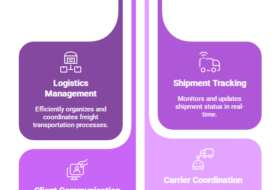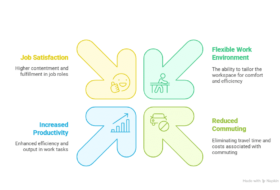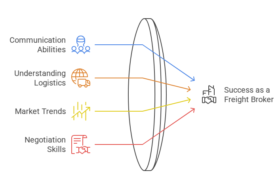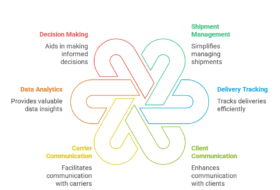Table of Contents
- Introduction
- Why Finding the Right Carrier is Crucial
- Steps to Find Carriers for Your Freight
- Factors to Consider When Choosing a Carrier
- Tools and Resources to Help You Find Carriers
- Conclusion
Introduction
In the world of logistics, one of the most critical tasks is to find carriers that can efficiently and reliably transport your freight. Whether you’re a freight broker, a shipper, or a business owner, finding the right carriers is essential to ensuring that your goods are delivered on time and in good condition. This guide will walk you through the process of finding the best carriers for your needs.
Why Finding the Right Carrier is Crucial
The success of your shipping operations depends heavily on the carriers you choose. The right carrier can offer reliable service, cost-effective rates, and timely deliveries, all of which are crucial for maintaining customer satisfaction and business efficiency. On the other hand, choosing the wrong carrier can lead to delays, damaged goods, and increased costs. Therefore, it’s essential to invest time and resources to find carriers that align with your shipping requirements.
Steps to Find Carriers for Your Freight
Finding the right carriers doesn’t have to be a daunting task. Here’s a step-by-step process to help you:
- Identify Your Shipping Needs: Start by determining the type of goods you need to ship, the volume, and the destinations. This will help you narrow down the type of carrier you need, whether it’s a local, regional, or national carrier.
- Research Carrier Options: Use online freight marketplaces, industry directories, and carrier databases to compile a list of potential carriers. Websites like DAT and Truckstop.com are excellent resources for finding carriers.
- Check Carrier Credentials: Verify the carrier’s credentials, including their operating authority, insurance coverage, and safety ratings. The Federal Motor Carrier Safety Administration (FMCSA) website is a valuable resource for this.
- Request Quotes: Contact the carriers on your list to request quotes. Be sure to provide detailed information about your shipping needs so they can give you an accurate estimate.
- Evaluate Carrier Performance: Consider factors like on-time delivery rates, customer reviews, and the carrier’s reputation in the industry. This will help you choose a carrier that meets your quality standards.
- Negotiate Contracts: Once you’ve selected a carrier, negotiate the terms of the contract, including rates, payment terms, and service level agreements (SLAs). Ensure that everything is clearly documented to avoid misunderstandings later on.
Factors to Consider When Choosing a Carrier
When you set out to find carriers, several key factors should guide your decision-making process:
- Reliability: Look for carriers with a strong track record of on-time deliveries and consistent service.
- Cost: While cost is important, it shouldn’t be the only consideration. Balance cost with the level of service provided.
- Capacity: Ensure the carrier has the capacity to handle your freight volume, especially during peak seasons.
- Technology: Carriers that use advanced technology for tracking and communication can provide greater transparency and efficiency.
- Customer Service: Good customer service is crucial. Choose a carrier that is responsive and easy to communicate with.
Considering these factors will help you find a carrier that meets your specific needs and ensures smooth shipping operations.
Tools and Resources to Help You Find Carriers
Several tools and resources can simplify the process of finding carriers:
- Freight Marketplaces: Platforms like DAT and Truckstop.com allow you to search for carriers, compare rates, and read reviews.
- Carrier Databases: The FMCSA’s SAFER system lets you search for carriers by name or DOT number to check their safety records and credentials.
- Load Boards: Posting your freight on load boards can help you attract carriers looking for loads to haul.
- Industry Networks: Joining industry associations or networks can give you access to a wider pool of trusted carriers.
Using these tools will make it easier to find carriers that are a good fit for your shipping needs.
Conclusion
Finding the right carriers is a crucial aspect of successful logistics and freight management. By taking the time to identify your needs, research your options, and evaluate potential carriers, you can build strong partnerships that ensure the efficient and timely delivery of your goods.
The key to success is not just to find carriers but to find the right carriers who can meet your specific needs. With the right approach and the right tools, you can secure reliable carriers that help you maintain a smooth and cost-effective supply chain.
Remember, the quality of your carriers directly impacts your business’s reputation and customer satisfaction. Invest in finding the best carriers, and you’ll see the benefits in your bottom line.itment to customer satisfaction, you’ll be well-equipped to navigate the complexities of international shipping and achieve your business goals.s industry. We look forward to helping you achieve your professional goals and supporting you throughout your journey.
Growth + Change = Opportunity! How are you going to capitalize on the opportunity as a freight broker, agent, dispatcher or box truck carrier?
Enroll in a course today and get a Shippers List for free! Use Code: freeship








